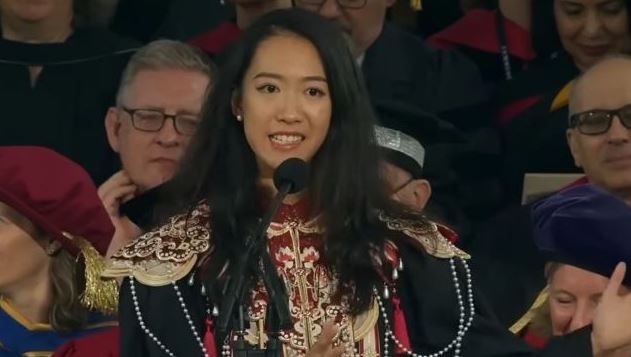A Beijing loyalist spoke at the prestigious university’s graduation ceremony. She criticized the U.S. but ignored China’s human rights violations.
Kok Bayraq
06/10/2025, Bitter Winter
History turned a new, comic, and ironic page on May 29: the Chinese Communist Party (CCP) delivered a “humane” lesson to the world—including the West—on the stage of Harvard University when Jiang Yurong became the first Chinese woman to speak at a graduation ceremony. The speech emphasized humanity’s shared interests and implicitly criticized Trump’s visa ban on Chinese students. Western audiences were impressed, applauded enthusiastically, and helped amplify the speech across various platforms.
If the lecture was the first act of this tragicomedy, the applause was the second. The first act was performed by a loyalist of the CCP; the second by well-meaning but naive Western academics.
Why do we call Jiang Yurong a CCP loyalist? Because she, like hundreds of thousands of other Chinese students, could only study at Harvard after passing the CCP’s political vetting. During her time in the free world, she never spoke about the oppression of the Chinese people, never expressed concern over the Uyghur Genocide perpetrated by the Chinese state, never showed shame when Xi Jinping declared the indefinite extension of his rule, and never uttered a word of conscience when Nobel laureate Liu Xiaobo died in prison. In short, she never objected to the CCP’s atrocities against its own citizens.
This isn’t surprising. She studied abroad with the support of the CCP, benefits from the political system the CCP created, and has pledged lifelong loyalty to the Party. What is surprising—indeed, offensive—is that she now dares to lecture us on humanity. To me, this “lesson” is not only absurd but an insult to my intelligence.
In her speech, Jiang expressed sympathy for mothers worldwide who lack access to menstrual pads. Yet in her own country, Uyghur mothers aren’t worried about pads—they are searching for the remains of children taken from them and “disappeared.” Jiang mourned innocent children killed in wars elsewhere, while in the Uyghur region, children are not only killed, but are sometimes never allowed to be born. Why have the cries of Uyghur mothers and children—clearly documented in the “Xinjiang Police Files”—failed to move Jiang Yurong’s conscience? Even off the Harvard stage, she has shown no sympathy for the Uyghur genocide, now an internationally recognized atrocity for more than eight years. Can someone who has ignored a genocide at home truly feel empathy for suffering elsewhere?
Do we require more evidence of loyalty to the CCP than silence in the face of repression? If you listen closely, her speech offers more subtle and insidious signs of allegiance. Jiang used a story about Tanzanian students using refrigerators to subtly highlight the global spread of Chinese products—an implicit celebration of the CCP’s influence. She reiterated the CCP’s tired defense of its record: “feeding one billion people,” as if that excuses all crimes. She affirmed, “We are the generation that will end poverty,” echoing CCP propaganda.

Midway through her talk, she subtly defended China’s sham electoral system—“democratic centralism”—saying, “There must be different views, different votes, different feelings in the world.” It was a calculated move. By invoking the language of diversity, she reframed China’s lack of genuine elections as a legitimate difference rather than tyranny. Without ever mentioning the word “election,” she cloaked dictatorship in the language of democracy, making it more acceptable to a Western audience.
This is precisely what the CCP expects of its students abroad: to repackage Party propaganda in terms palatable to Western audiences, while avoiding any statements that could raise doubts about the regime. Some people—especially Westerners—might think I’m reading too much into her speech, or that her words were coincidental. However, as someone who grew up under this regime and has studied its behavior, I am convinced: Jiang Yurong’s speech was a CCP-sanctioned propaganda performance staged on an elite Western platform. Those of us from China are well aware: her family may soon receive flowers and gifts from CCP officials for her performance.
More than one million Chinese students have studied in the United States. They have absorbed advanced technology but not the values of human rights, justice, freedom, or equality. Their return has benefited China’s economy but not its politics. On the contrary, their presence has helped legitimize the CCP’s grip on power. A more powerful CCP has continued to deny Chinese citizens the right to vote and has perpetrated genocide against non-Han groups like the Uyghurs. Now it openly competes with the United States for global dominance.
Many of these students remained silent while abroad and became tools of the regime upon returning. In the internment camps of East Turkestan, where more than three million Uyghurs are detained, modern surveillance technology plays a central role. Chinese students educated abroad have contributed to building this system—some directly, others indirectly. Either way, they are complicit in the genocide.

The past thirty years reveal a harsh truth: students chosen by a dictatorship rather than selected through free competition will not serve their people or promote global peace. Instead, they will serve the dictatorship and make the world more dangerous.
While the previous generation of Chinese students tacitly supported the CCP on the global stage, the current generation—represented by Jiang Yurong—actively promotes its interests and assumes leadership roles.
Her speech at Harvard reaffirms the moral, rational, and strategic foundations of President Trump’s visa restrictions on Chinese students.

